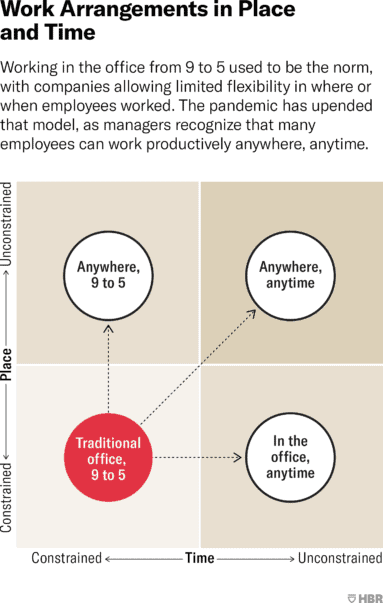Last year I summarised the work from home conundrum in terms of research from – Sociology, Economics, Anthropology and Behavioural Science. It generated a lot of interest and requests for practical applications to do Hybrid / Remote right- here are a few best practices and policies. If you want to see the previous article- the link is here
Theory
- Completely remote in the knowledge economy is not advisable as people miss out on – what psychologist Edward Hallowell calls a human moment: face-to-face encounter that allows for empathy, emotional connection, and nonverbal cues to complement what is actually said
- The Human Dynamics group in the MIT Media Lab collected data from employees’ electronic badges and found that frequent face-to-face interactions outside formal meetings were the best predictor of productivity.
- To help managers conceptualize the two-dimensional nature of this problem, Lynda Gratton uses the following 2 x 2 matrix

- Microsoft’s Study group lead by Mary Czerwinski found that People have 250 percent more meetings every day than they did before the pandemic
- People missed offices because of what Jennifer & Gianpiero Petriglieri described as -“ identity workspaces”. – spaces where we learn what it means, and what it takes to be someone — say, a good soldier, chef, lawyer, doctor, accountant, leader. Through a bundle of stories, practice, feedback, rituals, and relations
- Detailed studies even before the pandemic showed that work from home / Flexibility results in a productivity boost. A Study in China showed that not only there was a 13% increase in productivity but significant reduction in attrition and sick days taken. Some of the other benefits are
- Reassess the Value of Visibility- One of the biggest challenges will be to equally assess and give opportunities to remote workers vis-a vis on-site workers
Best Practices
- Meeting Free days are essential for mental wellness and dramatically boost productivity and engagement – ideally 2-3 days should be meeting free – depending on the level
- Informal Engagement is missed even by introverts- the best make rituals that foster this as a habit- for example Frog has Rituals that foster informal learning- from Monday Morning Meetings (where recurring themes across projects and industries are discussed or new content is shared in a presentation) to Wellness Wednesdays (during which, for example, a yoga class might be taught) to coffee time every afternoon and happy hours for team members and occasionally for clients.
- Create Productive spaces– give the budget/flexibility to find one . Your HR team needs to figure out folks who might be struggling with Remote- for example surveys of women in India have revealed that their workload has increased significantly . Also some groups may not have space in their home from where they can be productive – give them a budget to work from a co-working space
- Embrace Asynchronous communication– Employees in different time zones and work arrangement need to feel part of the team – this might require converting daily stand up meeting to written documents that enable discussion in the comments or using technology to create artifacts that can be shared later- recorded zoom meetings, automatically generated transcripts of video calls
- Make communication boundaries clear– each channel should have set rules understood across the organisation
- Access to wellness programs /gyms/cafes in their remote location can help boost engagement
- Overinvest in Onboarding – Do not make people feel lost for too long
- Nitin Nohria – the Harvard business school in his article in WSJ says that the post pandemic office should be a clubhouse !!- ““In an office functioning as a clubhouse, people will be mingling in informal conversations that might resemble ‘happy hour.’”“
- Factor in the Cost of coming to the office – After two years of remote work, spending a day in the office can be a shock to the wallet – and rising costs are making it worse.
- Mental health should be a priority– The remote / hybrid worker can be fighting “demons ” without the outlet/safe space of an office or work colleagues – Leaders need to build structures which can give access to support groups or mental health experts
Kissflow- Doing Remote Right
- The organization has given the freedom for teams to choose between hybrid work or in-office.
- Individual teams will decide to choose between the two.
- Every team is expected to work in-office for one week in a month.
- Employees who are not from the city are encouraged to move back to their hometowns to reduce expenses, strengthen family/social bonds, and contribute to the local community.
- The company will provide accommodation for those who travel into the city during the one week of in-office work.
- Monthly meetups will be hosted, meant for socializing to build and strengthen cross-team relationships.
- A quarterly conference will be hosted, where all teams will come together to showcase their work milestones achieved, and will also include learning and fun sessions.
- Off-site trips will be organized every quarter.
- Teams will explore tech tools that can facilitate design discussions and informal chats.
- Productivity will be measured against objectives rather than initiatives. This will reinforce freedom and autonomy by pushing control to the team level instead of centralizing it.
- We will make a conscious effort to hire employees who thrive in a remote work environment.
- The company will contribute significantly to help employees set up comfortable home-office infrastructure.
Capital One- Hybrid Policy one of the first to make a great policy
In order to support both team collaboration and individual flexibility, our initial hybrid approach will have the following principles:
- Mondays and Fridays will be enterprise-wide virtual work days, where associates will work individually from home, or from wherever they work best. Capital One offices will be open with limited services for associates who seek to come in for independent and heads-down work. All meetings should be virtual
- On Tuesdays, Wednesdays, and Thursdays Capital One offices will be fully open
- We strongly encourage associates to come into the office and spend meaningful time there in collaboration with colleagues
- We also want to respect individual flexibility and preferences, as we always have. In-office attendance will not be mandatory on specific days or over specific periods
- We will continue to support fully-remote exceptions with senior executive approval
Airbnb & Shopify- Remote/ Hybrid Veterans
Both these companies are veterans at doing remote right – if you want more details just visit the following pages
- Airbnb’s design for employees to live and work anywhere
- Wherever you are, your next journey starts here- Shopify
References
- WFH- A Reality check- Blog by Omar Farooq
- MIT Sloan- The Surprising Impact of Meeting-Free Days- Ben Laker, Vijay Pereira, Pawan Budhwar, and Ashish Malik
- Microsoft- The rise of the Triple Peak day
- In Praise of the Office by Gianpiero Petriglieri – HBR
- The Post-Pandemic Office Should Be a Clubhouse by Nitin Nohria -Wall Street Journal
- How to Do Hybrid Right by Lynda Gratton- HBR- From the Magazine (May–June 2021)
- Capital One’s U.S. Offices Fully Hybrid September 6
- Kissflow launches REMOTE+ an industry-first work model for the After-COVID era
- The sky-high cost of returning to the office- By Sophia Epstein21st April 2022 BBC
- Equity in the Hybrid Office – MIT Sloan
- What Great Hybrid Cultures Do Differenatly by James Stanier, Michael Li, and Jesse Anderson
- The Loneliness of the Hybrid Worker- MIT Sloan Caroline Knight, Doina Olaru, Julie Anne Lee, and Sharon K. Parker


Pingback: 2023 TECHNOLOGY TALENT MARKET- INSIGHTS BY ACEPROHR – AceProHR